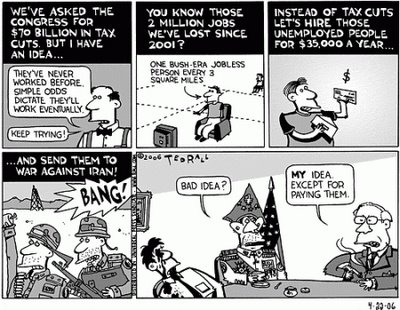How many lies can Ted Rall make in one cartoon?

Let's deal with it one frame at a time. Here's the truth about tax cuts. As Jack Kemp pointed out in 2003, Kennedy cut taxes. (I'm not the first to note that today he'd be shunned by his own party.) The result: economic boom and increased tax revenues. Reagan massively cut tax rates, especially on the very top incomes upon which most people's jobs depend. The result: the end of stagflation, increased federal tax revenues, and the prosperity of the 1980s (often wrongfully maligned as an era of "greed"). And before them, Calvin Coolidge and Congress in 1925 lowered the top tax rate to 25%. The result: continued economic prosperity through the rest of the 1920s, until the Federal Reserve pulled the carpet out from under Americans (cutting the money supply by a third, triggering the Great Depression).
Compare this with what Franklin Delano Roosevelt did to create a new low in the Great Depression. As I wrote in April 2005:
Keynesian-apologist bunk like this blames the Depression's sudden worsening on a cut in federal spending. The claim is that FDR wanted a balanced budget. The raw data shows that FDR's "balanced budget" had an 8% spending drop in 1937 compared to 1936 to 1937, and a 10% drop in 1938 compared to 1937 (17% overall). However, "tax receipts" surged 37% in 1937 compared to 1936, and then 25% in 1938 compared to 1937 -- an overall increase of 72%. Yes, the federal government cut spending, but it was simultaneously raising taxes -- raising taxes a lot. The top tax rate soared to 79% in 1936, after being raised to 63% in 1932. Massive spending cuts by themselves would have sufficed, but not with simultaneous tax hikes. The higher taxes and constrictive regulations simply discouraged businesses and their owners from doing anything profitable with money. Business owners could expand their businesses, but the after-tax income wouldn't be worth the increasing marginal cost. Would-be investors could save money, but who would borrow it? Government making it unprofitable to create wealth is why the Depression worsened, not because FDR wanted a balanced budget.Supply-siders like me point out that a balanced budget isn't everything. In fact, it's worse than government borrowing when it means tax hikes (which discourage economic activity) to finance continued high levels of spending.
Regarding the second panel, keep in mind that I'm just a regular Joe. I have no access to economic data to which any of you and Ted Rall are restricted. So when I look at BLS employment statistics, available to anyone in the world, and see that non-farm employment now is over 2 million greater than in January 2001, I can only think of one word to describe Rall's willful ignorance of plain facts: bullshit! I seem to be using that word a lot lately. Lately I've been really tired (not really overworked, but I have so much to do), and maybe liberals' idiocy is starting to get me.
By the way, Rall can't do simple mathematics, either. The United States has a surface area of 3,718,711 square miles (both land and water). So even were his stupidity true, it would be one "Bush era jobless person" every 1.86 miles.
At least his math was correct in the subsequent panels, but his perception of reality, as usual, was off. If the U.S. military recruited two million more people at annual pay of $35,000 each, the total cost would far exceed $70 billion. That's because the U.S. military has extremely high equipment costs per person. Compare the Pentagon's request of $440 billion for 2006, and the 1.4 million active duty personnel (with another 1.3 million or so reservists) in the U.S. armed forces. Keep this in mind the next time someone says that military personnel don't get paid enough. Not to denigrate military service, but when operating costs are extremely high, and your customers (American taxpayers in this case) are willing to pay only so much, you therefore cannot pay your employees very much. And it's possible because there is actually quite a labor pool of people who are willing to serve in the armed forces for not a lot of money (i.e. their employment value at the margin, as Don Boudreaux explained).
I suppose, though, that Rall would finance it with more tax cuts on the rich. Perhaps more tax hikes like FDR's, which plunged the U.S. deeper into the Depression? More tax hikes like Clinton's, which did nothing for the American economy, though Paul Krugman claims they "ushered in an economic boom"?
This is the economic argument. I'm not even getting into the moral argument: it's your money, so why should others have the authority (not "right" or "freedom") to take and spend it as they wish? "Theftinomics" is a word Rall made up to describe government economic policies that are based on theft and fraud. That's a perfect term, actually, for Rall's socialism (euphemistically called "progressive liberalism" by mainstream media). If someone makes $1 million without coercing anyone, without committing a crime, then why are any of us entitled to a penny of it? Yet governments at all levels insist on their cut, so they can redistribute it to everyone else.
It's said that a broken clock is still correct twice a day. Does it matter when a broken clock like Rall is correct but only for the wrong reasons?
Labels: Liberal hypocrisy, State worshippers, Supply-side economics, Taxes, Ted Rall


0 Comments:
Post a Comment
Subscribe to Post Comments [Atom]
<< Home